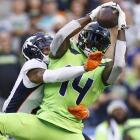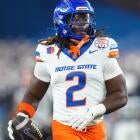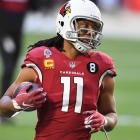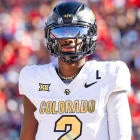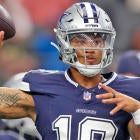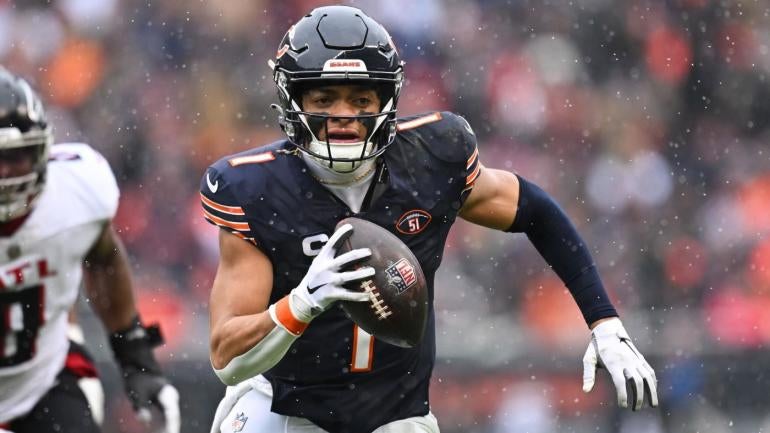
Who could have known exploring whether the Chicago Bears should take a quarterback at No. 1 overall or soldier forth with Justin Fields would become evergreen content?
A year after trading the No. 1 overall selection in the 2023 NFL Draft and the eventual rights to Bryce Young, the Bears are in the exact same position as a result of that trade, as the Panthers pick they acquired will be No. 1 overall.
Here are Chicago's options with that No. 1 overall selection:
Should the Bears trade Justin Fields and draft a quarterback?
Why would Chicago keep Justin Fields?
His play this season has inspired a bit more confidence in his capabilities moving forward. However, has it been enough to tip the scales in his favor? The NFC North franchise could keep their young quarterback and try to build upon the momentum established over the past several weeks. In that scenario, they could either select the best non-quarterback at No. 1 overall or trade out of the pick for the second consecutive year. The defense, particularly, has shown a lot of promise over the second half of the season since acquiring Montez Sweat. If the offense can catch up, the Bears should be able to rise quickly in a relatively open NFC. Chicago won five of their last eight games.
So, again, why would Chicago trade Justin Fields?
First, he was drafted by neither general manager Ryan Poles nor head coach Matt Eberflus. They do not have ties to the quarterback outside of the past year they have spent together. Fields, who is nearing the end of his third season, was drafted No. 11 overall. He is through 60% of his rookie contract if it is assumed that the fifth-year option would be used.
The Ohio State product flashed over his first two seasons in the NFL but was overwhelmingly inconsistent. Fields missed roughly a month of this season due to injury, valuable time as the two parties are learning whether or not it can be a fruitful union long-term. If his viability as a long-term starter is not clear and obvious, would the franchise not be better off taking another rookie quarterback with five cost-controlled years? Fields' improved play over the second half of the season should create more interest in his services on the trade market, which would likely be reflected in Chicago's potential trade return.
The fear every Bears fan has of trading Fields is that he goes elsewhere and becomes successful while their new quarterback is unable to deliver as hoped. It is a gamble.
What is not known is how Chicago's leadership feels about Fields and the prospective quarterback prospects. For that reason, it is impossible to entirely rule out the possibility of them moving in another direction. If there were an obvious upgrade at the position available, the Bears would probably go down that path.
Who could be interested in Fields, and what would it cost?
In this hypothetical, Chicago has taken a quarterback No. 1 overall. One of the perceived top-two quarterback prospects (USC's Caleb Williams and North Carolina's Drake Maye) is off the board, which leaves quarterback-needy teams like Washington, New England, Las Vegas, Tampa Bay, Minnesota and potentially Pittsburgh, Atlanta and Seattle jockeying for those remaining available players. LSU quarterback Jayden Daniels, Michigan quarterback J.J. McCarthy, Washington quarterback Michael Penix Jr. and Fields fall into that next bucket of high-upside quarterbacks.
Any of the aforementioned teams that do not land one of those two rookie quarterbacks could be interested in Fields.
What would it cost a team to acquire the Bears quarterback?
There is not a lengthy history of a prospect as naturally talented as Fields being traded three years into a rookie contract. A handful of veterans like Carson Wentz, Sam Bradford and Alex Smith have been traded for a first-round pick and a Day 2 pick well into their careers. Chicago is unlikely to receive a pick in the top half of the first round, so it is more likely that it would fetch a late first-round pick or potentially a few Day 2 choices.
What if the Bears trade the No. 1 overall selection?
Until last year, the No. 1 overall pick had not be traded since the Rams moved up from No. 15 overall in 2016 to select quarterback Jared Goff. The first overall selection had been traded one other time since 2000 -- when Atlanta traded up from No. 2 overall to select Virginia Tech quarterback Michael Vick in 2001.
There are a few recent examples of teams trading up for a quarterback, but none are "apples to apples" examples.
- In 2016, Philadelphia traded up from No. 8 overall to No. 2 overall for the right to select North Dakota State's Carson Wentz. The Browns received third- and fourth-round picks, as well as first- and second-round selections the following year.
- In 2017, Chicago traded up from No. 3 overall to No. 2 overall. In exchange, San Francisco received a third-round pick, a fourth-round pick and a third-round choice in 2018. The Bears used the pick to take North Carolina's Mitchell Trubisky.
- In the Goff trade, Los Angeles surrendered two first-round selections, including the No. 15 overall selection in 2016, two second-round picks and two third-round picks. Tennessee also received fourth- and sixth-round picks.
- In 2021, Miami received three first-round picks in total, including the No. 12 overall selection, as well as a third-round pick, from San Francisco in exchange for the No. 3 overall selection.
- In 2023, Chicago received two first round picks, including the No. 9 overall selection, and two second-round choices, plus star wide receiver D.J. Moore in exchange for the No. 1 overall pick.
Basic economics teach the principle of supply and demand. When supply is low and demand is high, costs are also very high. There are roughly 10 teams playing a game of musical chairs with four or five chairs.
SportsLine.com's R.J. White constructed an updated trade value chart a few years ago and placed 1,000 points on the No. 1 overall selection. The No. 2 overall selection is worth 695.80 points so it should be easy to see the value in having the first pick.
Since 2010, there have been 12 trades up the draft board in pursuit of a quarterback. In each of the 13 trades, the team trading the rights to the quarterback received greater compensation than the pick equivalency. On average, the team trading the higher pick received a +243.92 point differential, which is the equivalent of the No. 19 overall selection. In four of the 13 trades, the team moving up to take a quarterback sent a top-five pick back in the following draft.
The 2024 NFL Draft will take place from April 25-27 in Detroit. More draft coverage can be found at CBSSports.com, including the weekly updated draft order, mock drafts and a regularly available look at the eligible prospects.
![[object Object] Logo](https://sportshub.cbsistatic.com/i/2020/04/22/e9ceb731-8b3f-4c60-98fe-090ab66a2997/screen-shot-2020-04-22-at-11-04-56-am.png)














